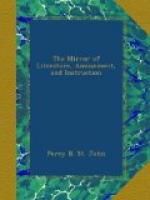“There cannot be a doubt,” said Isabel, “that the Pope has long ago been applied to by my husband to dissolve our marriage.”
“And that his holiness has granted the petition, too,” said I. “And although ours be a new case, as it probably never happened before that the idea of marrying was entertained by persons in solitary imprisonment,—yet as there is here neither church nor priest, Heaven will, without doubt, accept our vows, and bless us:” and thus did I become all but the husband of Isabel.
Several days elapsed before it was again the turn of Isabel to watch on the summit; meantime the food that was intended for one, was made to suffice for two; we conversed in whispers, lest my embryo plan of escape should be frustrated by a premature discovery of my dwelling place; and even if I had looked to no ulterior advantages, from my change of quarters, the society of Isabel would have been a sufficient reward for the peril of my journey. But I had now concocted in my mind, a plan of escape, which I hastened to put in execution, after having first communicated it to Isabel, whose co-operation was necessary to ensure its success.
It may have been already gathered, that the characteristic of the punishment of solitary confinement in the towers of Tarifa, consisted in the rigidness with which it was enforced: once admitted there, and no human eye ever more rested upon the living form of the prisoner. The food necessary for the preservation of life, and therefore, for the continuance of punishment, was placed, and removed, by unseen hands; nor was the sound of a human voice ever heard within these stone chambers. But to this, one exception was provided: although it was the policy of the law, to punish the living culprit thus severely, the church did not resign her claims to the care of his soul; once accordingly, in every month, a holy tread was heard along the secret passages, and an iron screen being thrown hack, the confessor, a Franciscan friar, took his seat at a thick grating; behind which nothing could be seen, though the confession of the prisoner might pass to the ear of the holy man, and his counsel in return reach the ear, or it might be, the heart, of the solitary criminal. The door by which the prisoner first entered was never unbarred, until the hour when his coffin was carried in and out.
The day now approached, when the visit of the confessor might be expected, and I laid my plans accordingly, and executed them in the following manner:
“Isabel,” said I, as the slow tread announced the approach of the confessor, “you must feign to be dead; spread the pallet opposite to the grating, and lay yourself upon it.”
I found some difficulty in prevailing upon Isabel to mock the king of terrors; but, at length, I succeeded in persuading her,—by representing that it was easier to counterfeit death than to meet it; and that to do the one afforded the only chance of avoiding the other; and scarcely was Isabel extended upon the floor, when the screen was heard to open upon its harsh hinges, and the confessor to say, “erring daughter, approach.”




